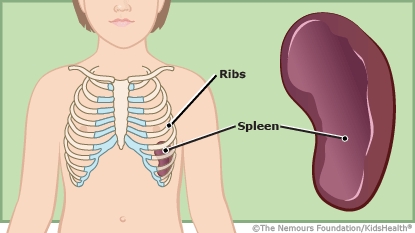- Parents Home
- Para Padres
- A to Z Dictionary
- Allergy Center
- Asthma
- Cancer
- Diabetes
- Diseases & Conditions
- Doctors & Hospitals
- Emotions & Behavior
- First Aid & Safety
- Flu (Influenza)
- Food Allergies
- General Health
- Growth & Development
- Heart Health & Conditions
- Homework Help Center
- Infections
- Newborn Care
- Nutrition & Fitness
- Play & Learn
- Pregnancy Center
- Preventing Premature Birth
- Q&A
- School & Family Life
- Sports Medicine
- Teens Home
- Para Adolescentes
- Asthma
- Be Your Best Self
- Body & Skin Care
- Cancer
- Diabetes
- Diseases & Conditions
- Drugs & Alcohol
- Flu (Influenza)
- Homework Help
- Infections
- Managing Your Weight
- Medical Care 101
- Mental Health
- Nutrition & Fitness
- Q&A
- Safety & First Aid
- School, Jobs, & Friends
- Sexual Health
- Sports Medicine
- Stress & Coping
The Spleen
What Is the Spleen?
The spleen is a fist-sized organ in the upper left part of the belly under the ribcage. It helps protect the body by clearing worn-out red blood cells and other foreign bodies (such as germs) from the bloodstream.
The spleen is part of the lymphatic system, which is an extensive drainage network. The lymphatic (lim-FAT-ik) system works to keep body fluid levels in balance and to defend the body against infections. It is made up of a network of lymphatic vessels that carry lymph — a clear, watery fluid that contains proteins, salts, and other substances — throughout the body.
What Does the Spleen Do?
The spleen is an important part of the immune system. It:
- acts as a filter, weeding out old and damaged cells
- helps control the amount of blood and blood cells that circulate in the body
- helps get rid of germs. The spleen has special white blood cells called lymphocytes (LIM-fuh-sites) and macrophages (MA-kruh-fages). These cells attack and destroy germs, and remove them from the blood that passes through the spleen.
The body also uses the spleen as a place to store blood and iron for future use.
What Problems Can Happen?
A blow or blunt trauma to the abdomen can injure the spleen, causing it to tear ("lacerate") or be bruised. Doctors grade spleen lacerations on a scale from 1–5, where 1 is the least severe and 5 is the most severe.
In the past, doctors often did a surgery called splenectomy (splih-NEK-tuh-mee) to remove an injured spleen. But most spleen bruises and lacerations heal with lots of rest and limiting physical activity. Because it's so important to preventing infections, doctors will do all they can to help an injured spleen heal without removing it.
Some diseases can affect the spleen. For example, sickle cell disease damages the spleen early in childhood and it soon stops working. So people with sickle cell disease need extra protection from the germs that the spleen normally filters out.
When someone has infectious mononucleosis, their spleen can get larger than usual. A spleen that is bigger than it should be is more likely to be injured. So someone who has mono needs to avoid contact sports until their spleen is back to normal size.
